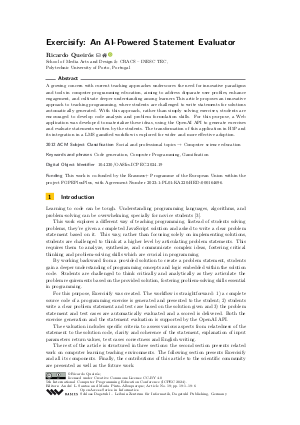Exercisify: An AI-Powered Statement Evaluator
Author
Ricardo Queirós 
-
Part of:
Volume:
5th International Computer Programming Education Conference (ICPEC 2024)
Part of: Series: Open Access Series in Informatics (OASIcs)
Part of: Conference: International Computer Programming Education Conference (ICPEC) - License:
 Creative Commons Attribution 4.0 International license
Creative Commons Attribution 4.0 International license
- Publication Date: 2024-09-25
File

PDF
OASIcs.ICPEC.2024.19.pdf
- Filesize: 0.52 MB
- 6 pages
Document Identifiers
Subject Classification
ACM Subject Classification
- Social and professional topics → Computer science education
Keywords
- Code generation
- Computer Programming
- Gamification
Metrics
- Access Statistics
-
Total Accesses (updated on a weekly basis)
0PDF Downloads0Metadata Views
Abstract
A growing concern with current teaching approaches underscores the need for innovative paradigms and tools in computer programming education, aiming to address disparate user profiles, enhance engagement, and cultivate deeper understanding among learners This article proposes an innovative approach to teaching programming, where students are challenged to write statements for solutions automatically generated. With this approach, rather than simply solving exercises, students are encouraged to develop code analysis and problem formulation skills. For this purpose, a Web application was developed to materialize these ideas, using the OpenAI API to generate exercises and evaluate statements written by the students. The transformation of this application in H5P and its integration in a LMS gamified workflow is explored for wider and more effective adoption.
Cite As Get BibTex
Ricardo Queirós. Exercisify: An AI-Powered Statement Evaluator. In 5th International Computer Programming Education Conference (ICPEC 2024). Open Access Series in Informatics (OASIcs), Volume 122, pp. 19:1-19:6, Schloss Dagstuhl – Leibniz-Zentrum für Informatik (2024)
https://doi.org/10.4230/OASIcs.ICPEC.2024.19
BibTex
@InProceedings{queiros:OASIcs.ICPEC.2024.19,
author = {Queir\'{o}s, Ricardo},
title = {{Exercisify: An AI-Powered Statement Evaluator}},
booktitle = {5th International Computer Programming Education Conference (ICPEC 2024)},
pages = {19:1--19:6},
series = {Open Access Series in Informatics (OASIcs)},
ISBN = {978-3-95977-347-8},
ISSN = {2190-6807},
year = {2024},
volume = {122},
editor = {Santos, Andr\'{e} L. and Pinto-Albuquerque, Maria},
publisher = {Schloss Dagstuhl -- Leibniz-Zentrum f{\"u}r Informatik},
address = {Dagstuhl, Germany},
URL = {https://drops.dagstuhl.de/entities/document/10.4230/OASIcs.ICPEC.2024.19},
URN = {urn:nbn:de:0030-drops-209884},
doi = {10.4230/OASIcs.ICPEC.2024.19},
annote = {Keywords: Code generation, Computer Programming, Gamification}
}
Author Details
Funding
This work is co-funded by the Erasmus+ Programme of the European Union within the project FGPEPlusPlus, with Agreement Number 2023-1-PL01-KA220-HED-000164696.
References
-
Yannik Bauer, José Paulo Leal, and Ricardo Queirós. Can a Content Management System Provide a Good User Experience to Teachers? In 4th International Computer Programming Education Conference (ICPEC 2023), volume 112 of Open Access Series in Informatics (OASIcs), pages 4:1-4:8, Dagstuhl, Germany, 2023. Schloss Dagstuhl - Leibniz-Zentrum für Informatik.

-
Ghader Kurdi, Jared Leo, Bijan Parsia, Uli Sattler, and Salam Al-Emari. A systematic review of automatic question generation for educational purposes. International Journal of Artificial Intelligence in Education, 30, 2019.

-
José Carlos Paiva, Ricardo Queirós, José Paulo Leal, Jakub Swacha, and Filip Miernik. Managing gamified programming courses with the FGPE platform. Information, 13(2):45, 2022.

-
Niko Strijbol, Charlotte Van Petegem, Rien Maertens, Boris Sels, Christophe Scholliers, Peter Dawyndt, and Bart Mesuere. Tested - an educational testing framework with language-agnostic test suites for programming exercises. SoftwareX, 22:101404, 2023.

-
Nguyen Binh Duong Ta, Hua Gia Phuc Nguyen, and Gottipati Swapna. Exgen: Ready-to-use exercise generation in introductory programming courses. In Proceedings of the 31st International Conference on Computers in Education Conference, pages 1-10, Matsue, Shimane, Japan, december 4-8 2023.

-
Laura Zavala and Benito Mendoza. On the use of semantic-based aig to automatically generate programming exercises. In Proceedings of the 49th ACM Technical Symposium on Computer Science Education, SIGCSE '18, pages 14-19, New York, NY, USA, 2018. Association for Computing Machinery.

